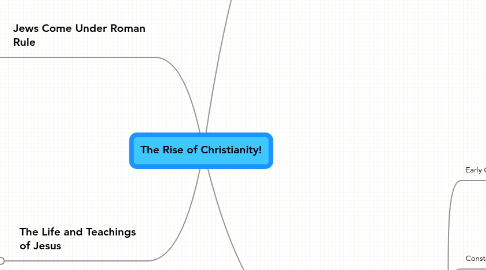
1. Jews Come Under Roman Rule
1.1. Jewish kings ruled as Representatives of Rome.
1.1.1. The Jews allied with the Romans.
1.1.1.1. They planed to "Romanize" Jerusalem.
1.2. The ruler, Herod, he died which caused a revolt.
1.2.1. Rome took over the Jewish Kingdom.
1.2.1.1. They made it into Province of Judea.
2. The Life and Teachings of Jesus
2.1. Jesus' Message
2.1.1. At 30, Jesus began his ministry.
2.1.1.1. For three years he preached, taught, did good works, and reportedly preformed miracles.
2.1.1.1.1. Many believed he was the long awaited Messiah.
2.1.2. He had diciples that followed him called Apostles.
2.1.2.1. This consisted of twelve people.
2.1.3. Jesus emphasized God's personal relationship to each human being.
2.1.3.1. He stressed the importance of people's love for God.
2.2. Jesus' Death
2.2.1. When he returned to Jerusalem there was split views about him.
2.2.1.1. Pilate arrested Jesus and sentenced him to be crucified.
2.2.1.1.1. Because he challanged the authority of Rome.
2.2.2. The head follower, Peter, spread the teachings of Jesus.
2.2.2.1. People believed that his body began to appear after his death.
2.2.2.1.1. The cross that he was killed on became the symbol for their beliefs.
3. Christianity Spreads Through the Empire
3.1. Paul's Mission
3.1.1. Paul had great influance on Christianity's development.
3.1.1.1. at first he was against Christianity.
3.1.1.1.1. Paul stressed that Jesus was the son of God.
3.1.2. Pax Romana provided the conditions to have Christianity spread.
3.2. Percecution of the Christians
3.2.1. Christians posed a problem for Roman Rulers.
3.2.1.1. They refused to worship Roman Gods.
3.2.1.1.1. This is known as the Roman Rule.
3.2.2. The Pax Romana began to crumble.
3.2.2.1. Romans began to execute Christians for not worshiping Roman Gods.
3.2.2.1.1. Despite the efforts Christianity became a powerful religion.
3.2.2.1.2. Martyrs were willing to sacrifice their life for the sake of their belief.
3.3. Jewish Rebellion
3.3.1. A band of Sealots rebelled against Rome.
3.3.1.1. The Romans stormed Jerusalem and destroyed the Temple.
3.3.1.1.1. What is left is known as a Jewish Shrine.
3.3.2. Half a million Jews were killed.
3.3.3. Diaspora is the dispersal of the Jews.
4. A World Religion
4.1. Early Christian Church.
4.1.1. Christians began to give their religion a structure.
4.1.1.1. A bishop was the person who supervised the local church.
4.1.1.1.1. Peter became the first bishop there.
4.1.1.1.2. Later bishop considered Peter to be the first pope!
4.1.1.1.3. Peter was called the father or the head of the christain church.
4.2. Constantine Accepts Christianity
4.2.1. Constantine was fighting three rivals for his title.
4.2.1.1. He prayed for divine help he gave credit when needed.
4.2.1.1.1. He announced the end of the killing of christians.
4.2.2. As christianity began to build it's strength, the emperor Theodosius made it the first offical religion.
4.3. Discord and Harmony
4.3.1. Heresy was the belief that appeared to contradict the basic teachings.
4.3.2. They official standard of belief was compiled into the New Testament.
4.3.2.1. This contained the four Gospels, Epistles of Paul, and other documents.
4.3.3. Constantine made the basic beliefs of the Church.
4.4. The Fathers of the Church
4.4.1. Influential in defining Church teachings were several early writers and scholars who have been called Fathers of the church.
4.4.1.1. Augustine was the most important bishop and was the bishop of Hippo in North Africa!
4.4.1.1.1. Augustine taught that while humans needed the grace of God.
4.4.1.1.2. His famous book is "The City of God"
4.4.2. Christianity increased in both power and wealth despite the Empire's Growing internal and external problems.
